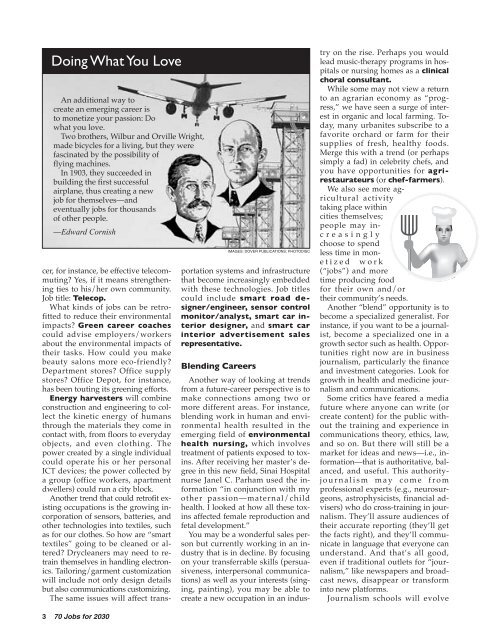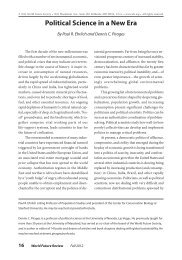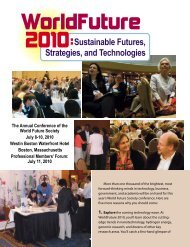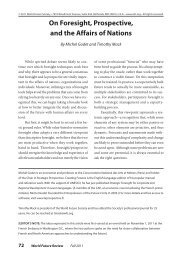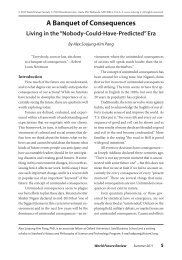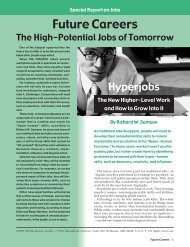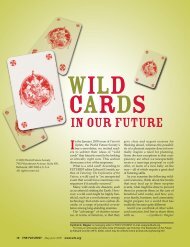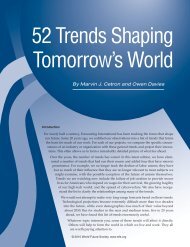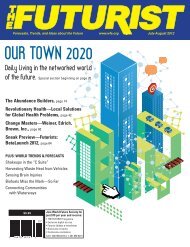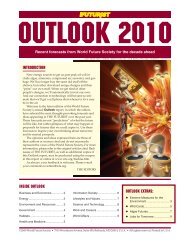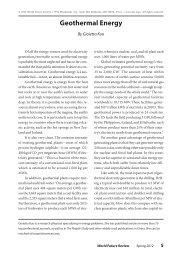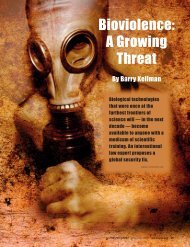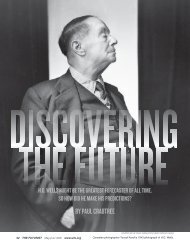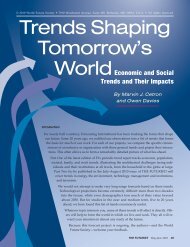70 Jobs for 2030 - World Future Society
70 Jobs for 2030 - World Future Society
70 Jobs for 2030 - World Future Society
Create successful ePaper yourself
Turn your PDF publications into a flip-book with our unique Google optimized e-Paper software.
Doing What You Love<br />
An additional way to<br />
create an emerging career is<br />
to monetize your passion: Do<br />
what you love.<br />
Two brothers, Wilbur and Orville Wright,<br />
made bicycles <strong>for</strong> a living, but they were<br />
fascinated by the possibility of<br />
flying machines.<br />
In 1903, they succeeded in<br />
building the first successful<br />
airplane, thus creating a new<br />
job <strong>for</strong> themselves—and<br />
eventually jobs <strong>for</strong> thousands<br />
of other people.<br />
—Edward Cornish<br />
cer, <strong>for</strong> instance, be effective telecommuting?<br />
Yes, if it means strengthening<br />
ties to his/her own community.<br />
Job title: Telecop.<br />
What kinds of jobs can be retrofitted<br />
to reduce their environmental<br />
impacts? Green career coaches<br />
could advise employers/workers<br />
about the environmental impacts of<br />
their tasks. How could you make<br />
beauty salons more eco-friendly?<br />
Department stores? Office supply<br />
stores? Office Depot, <strong>for</strong> instance,<br />
has been touting its greening ef<strong>for</strong>ts.<br />
Energy harvesters will combine<br />
construction and engineering to collect<br />
the kinetic energy of humans<br />
through the materials they come in<br />
contact with, from floors to everyday<br />
objects, and even clothing. The<br />
power created by a single individual<br />
could operate his or her personal<br />
ICT devices; the power collected by<br />
a group (office workers, apartment<br />
dwellers) could run a city block.<br />
Another trend that could retrofit existing<br />
occupations is the growing incorporation<br />
of sensors, batteries, and<br />
other technologies into textiles, such<br />
as <strong>for</strong> our clothes. So how are “smart<br />
textiles” going to be cleaned or altered?<br />
Drycleaners may need to retrain<br />
themselves in handling electronics.<br />
Tailoring/garment customization<br />
will include not only design details<br />
but also communications customizing.<br />
The same issues will affect transportation<br />
systems and infrastructure<br />
that become increasingly embedded<br />
with these technologies. Job titles<br />
could include smart road designer/engineer,<br />
sensor control<br />
monitor/analyst, smart car interior<br />
designer, and smart car<br />
interior advertisement sales<br />
representative.<br />
Blending Careers<br />
IMAGES: DOVER PUBLICATIONS; PHOTODISC<br />
Another way of looking at trends<br />
from a future-career perspective is to<br />
make connections among two or<br />
more different areas. For instance,<br />
blending work in human and environmental<br />
health resulted in the<br />
emerging field of environmental<br />
health nursing, which involves<br />
treatment of patients exposed to toxins.<br />
After receiving her master’s degree<br />
in this new field, Sinai Hospital<br />
nurse Janel C. Parham used the in<strong>for</strong>mation<br />
“in conjunction with my<br />
other passion—maternal/child<br />
health. I looked at how all these toxins<br />
affected female reproduction and<br />
fetal development.”<br />
You may be a wonderful sales person<br />
but currently working in an industry<br />
that is in decline. By focusing<br />
on your transferrable skills (persuasiveness,<br />
interpersonal communications)<br />
as well as your interests (singing,<br />
painting), you may be able to<br />
create a new occupation in an industry<br />
on the rise. Perhaps you would<br />
lead music-therapy programs in hospitals<br />
or nursing homes as a clinical<br />
choral consultant.<br />
While some may not view a return<br />
to an agrarian economy as “progress,”<br />
we have seen a surge of interest<br />
in organic and local farming. Today,<br />
many urbanites subscribe to a<br />
favorite orchard or farm <strong>for</strong> their<br />
supplies of fresh, healthy foods.<br />
Merge this with a trend (or perhaps<br />
simply a fad) in celebrity chefs, and<br />
you have opportunities <strong>for</strong> agrirestaurateurs<br />
(or chef-farmers).<br />
We also see more agricultural<br />
activity<br />
taking place within<br />
cities themselves;<br />
people may inc<br />
r e a s i n g l y<br />
choose to spend<br />
less time in mone<br />
t i z e d w o r k<br />
(“jobs”) and more<br />
time producing food<br />
<strong>for</strong> their own and/or<br />
their community’s needs.<br />
Another “blend” opportunity is to<br />
become a specialized generalist. For<br />
instance, if you want to be a journalist,<br />
become a specialized one in a<br />
growth sector such as health. Opportunities<br />
right now are in business<br />
journalism, particularly the finance<br />
and investment categories. Look <strong>for</strong><br />
growth in health and medicine journalism<br />
and communications.<br />
Some critics have feared a media<br />
future where anyone can write (or<br />
create content) <strong>for</strong> the public without<br />
the training and experience in<br />
communications theory, ethics, law,<br />
and so on. But there will still be a<br />
market <strong>for</strong> ideas and news—i.e., in<strong>for</strong>mation—that<br />
is authoritative, balanced,<br />
and useful. This authorityj<br />
o u r n a l i s m m a y c o m e f r o m<br />
professional experts (e.g., neurosurgeons,<br />
astrophysicists, financial advisers)<br />
who do cross-training in journalism.<br />
They’ll assure audiences of<br />
their accurate reporting (they’ll get<br />
the facts right), and they’ll communicate<br />
in language that everyone can<br />
understand. And that’s all good,<br />
even if traditional outlets <strong>for</strong> “journalism,”<br />
like newspapers and broadcast<br />
news, disappear or trans<strong>for</strong>m<br />
into new plat<strong>for</strong>ms.<br />
Journalism schools will evolve<br />
3 <strong>70</strong> <strong>Jobs</strong> <strong>for</strong> <strong>2030</strong>


